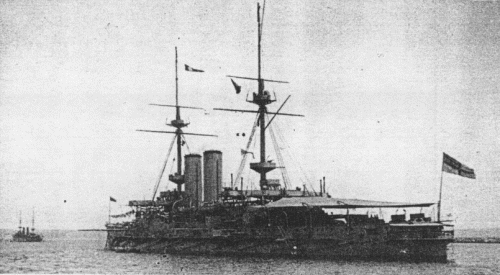
NAVYPEDIA
 Support the project with paypal
Support the project with paypal
Photo

Albermarle as completed
Ships
Name |
No |
Yard No | Builder |
Laid down |
Launched |
Comp |
Fate |
|---|---|---|---|---|---|---|---|
| Russell | 23 | 750 | Palmer, Jarrow | 11.3.1899 | 19.2.1901 | 2.1903 | sunk 27.4.1916 |
| Albermarle | 07, 06, N39 | Chatham DYd | 8.1.1900 | 5.3.1901 | 11.1903 | gunnery tender 5.1913 - 8.1914, barrack ship 5.1917 - 11.1918, sold for BU 11.1919 | |
| Montagu | Devonport DYd | 23.11.1899 | 5.3.1901 | 10.1903 | wrecked 30.5.1906 | ||
| Duncan | 43, 59, N53 | Thames Iron Wks, Blackwall | 10.7.1899 | 21.3.1901 | 10.1903 | gunnery tender 5.1913 - 8.1914, sold for BU 2.1920 | |
| Cornwallis | 33 | Thames Iron Wks, Blackwall | 19.7.1899 | 13.7.1901 | 2.1904 | sunk 9.1.1917 | |
| Exmouth | 12, 63, N44 | 638 | Laird, Birkenhead | 10.8.1899 | 31.8.1901 | 5.1903 | gunnery TS 7.1913 - 8.1914, sold for BU 2.1920 |
Technical data
| Displacement normal, t | Russell: 13270 Albermarle: 13440 Montagu: 13420 Duncan: 13640 Cornwallis: 13745 Exmouth: 13500 |
|---|---|
| Displacement full, t | 14900 - 15200 |
| Length, m | 123.4 pp 131.7 oa |
| Breadth, m | 23.0 |
| Draught, m | 7.85 |
| No of shafts | 2 |
| Machinery | 2 4-cyl VTE, 24 Belleville boilers |
| Power, h. p. | 18000 |
| Max speed, kts | 19 |
| Fuel, t | coal 2000 |
| Endurance, nm(kts) | 7200(10) |
| Armour, mm | belt: 178, bulkheads: 279 - 178, gun houses: 254 - 203, barbettes: 279 - 102, casemates: 152, decks: 51 - 25, CT: 305 |
| Armament | 2 x 2 - 305/40 BL Mk IX, 12 x 1 - 152/45 BL Mk VII, 10 x 1 - 76/40 12pdr 12cwt QF Mk I, 6 x 1 - 47/40 3pdr Hotchkiss Mk I, 4 - 450 TT (beam) |
| Complement | 720 |
Graphics
Project history
Duncan, Cornwallis, Exmouth and Russell were provided under the supplementary estimate of 1898 in answer to large additions to the French and Russian building programmes. Albermarle and Montagu were provided under the 1899-00 Estimates. Smaller editions of Formidable, they scarified armour for high speed to match the reported fast Russian battleships. The designed load displacement was 14000t. Duncans were actually designed before London class and initiated improvements in protection adopted in those ships, but their construction was delayed and the first two Londons were laid down prior to Duncans.
High speed was provided for by increasing the machinery power by 3000hp and modifying the hull form for a designed maximum speed of 19kts and a sea speed of 18kts. 4-cyl TE engines were adopted for the first time, and these employed wind-sails instead of cowl ventilators. They were good steamers, the best of the class on trials being Cornwallis (19.56kts) and the best in service was Albermarle.
Ship protection
The armour distribution was similar to that of London but with belt and barbettes of reduced thickness. The main 178mm belt was 72.6m long by 4.6m deep and continued to the bow with 127mm, 102mm and 76mm plates. The barbettes were 279-254mm, reducing to 178mm and 102mm forward and 102mm aft behind the belt. The decks were as in London except that the middle deck was 25mm on the slope as well as on the flat.
Modernizations 9.
1916-5/1917, Albermarle: - 8 x 1 - 152/45 on main deck; + 4 x 1 - 152/45 on the battery deck
Naval service
Albermarle became gunnery tender in May 1913 and joined Grand Fleet again in August 1914. 11.11.1915 while heavily loaded with spare ammunition she was badly damaged by bad weather in the Pentland Firth, losing her bridge, ship was under repair till December. From May 1917 to November 1918 she served as an overflow ship to naval barracks at Devonport, in reserve. Cornwallis 9.1.1917 E of Malta was hit by three torpedoes from German submarine U32 but remained afloat long enough for all but 15 men to be taken off. Duncan ran aground in May 1906 on Lundy while trying to help Montagu and suffered damages. In May 1913 - August 1914 she served as gunnery tender and in 1917 went into reserve to provide manpower for other ships. Exmouth in July 1913 - August 1914 served as gunnery TS at Devonport, in 1917 she was paid off into reserve. Montagu 30.5.1916 while in thick fog ran hard aground on Lundy Island. She proved beyond salvage, but her guns and other equipment were recovered, leaving the wreck to be broken up where it lay. Russell was mined off Malta 27.4.1916 with the loss of 126 men.
Many thanks to Wolfgang Stöhr for additional information on this page.
 HOME
HOME FIGHTING SHIPS OF THE WORLD
FIGHTING SHIPS OF THE WORLD UNITED KINGDOM
UNITED KINGDOM DUNCAN 1 class battleships (6, 1903 - 1904)
DUNCAN 1 class battleships (6, 1903 - 1904)
